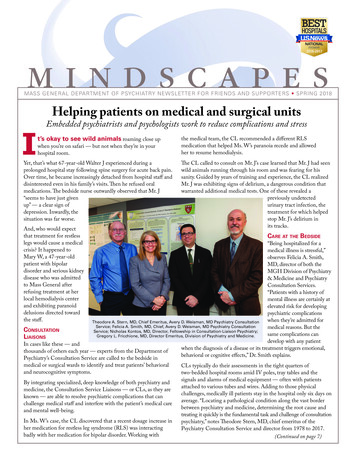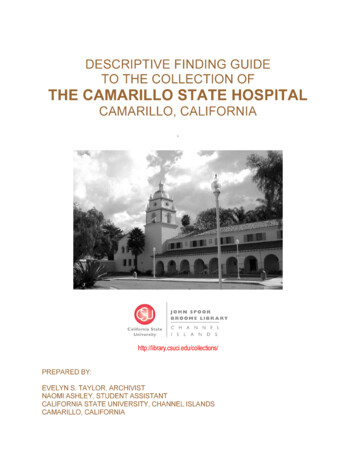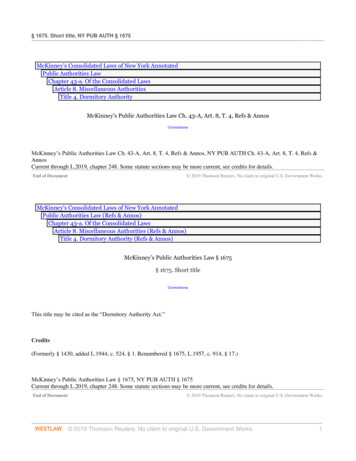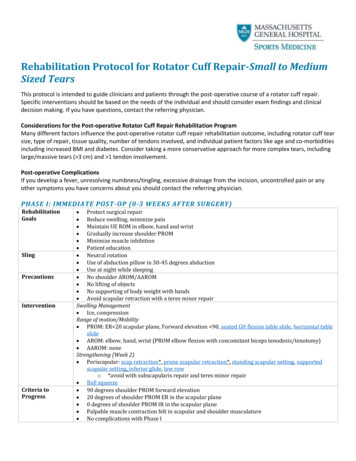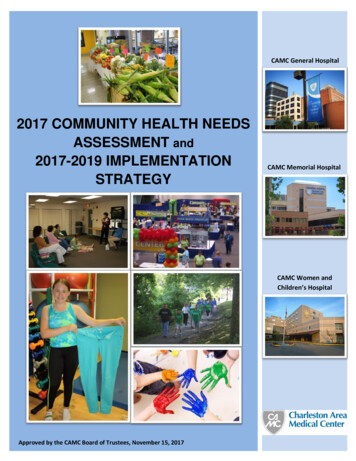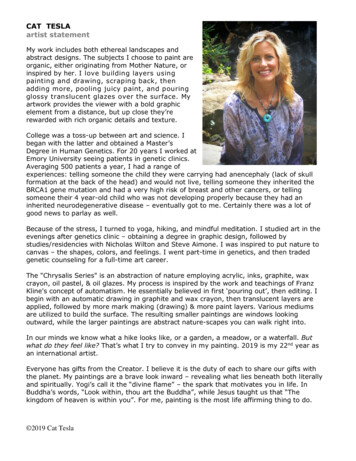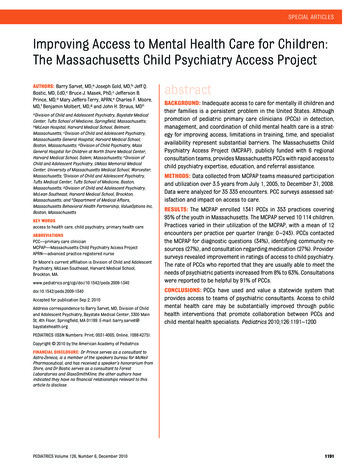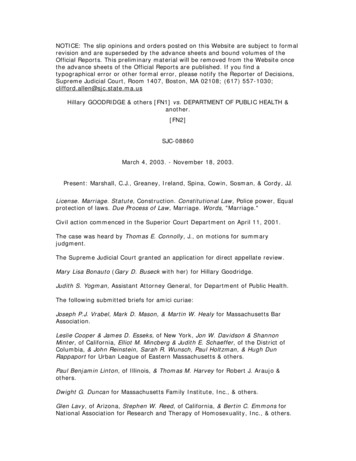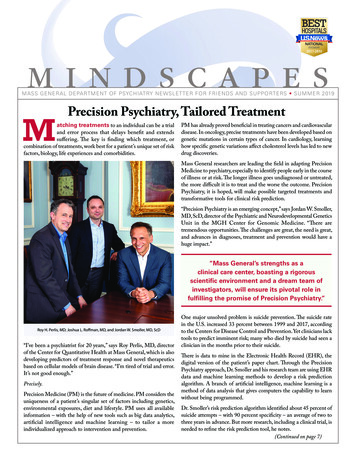
Transcription
M IN D SCAPESMASS GENERAL DEPARTMENT OF PSYCHIATRY NEWSLETTER FOR FRIENDS AND SUPPORTERS SUMMER 2019MPrecision Psychiatry, Tailored Treatmentatching treatments to an individual can be a trialand error process that delays benefit and extendssuffering. The key is finding which treatment, orcombination of treatments, work best for a patient’s unique set of riskfactors, biology, life experiences and comorbidities.PM has already proved beneficial in treating cancers and cardiovasculardisease. In oncology, precise treatments have been developed based ongenetic mutations in certain types of cancer. In cardiology, learninghow specific genetic variations affect cholesterol levels has led to newdrug discoveries.Mass General researchers are leading the field in adapting PrecisionMedicine to psychiatry, especially to identify people early in the courseof illness or at risk. The longer illness goes undiagnosed or untreated,the more difficult it is to treat and the worse the outcome. PrecisionPsychiatry, it is hoped, will make possible targeted treatments andtransformative tools for clinical risk prediction.“Precision Psychiatry is an emerging concept,” says Jordan W. Smoller,MD, ScD, director of the Psychiatric and Neurodevelopmental GeneticsUnit in the MGH Center for Genomic Medicine. “There aretremendous opportunities. The challenges are great, the need is great,and advances in diagnoses, treatment and prevention would have ahuge impact.”“Mass General’s strengths as aclinical care center, boasting a rigorousscientific environment and a dream team ofinvestigators, will ensure its pivotal role infulfilling the promise of Precision Psychiatry.”Roy H. Perlis, MD; Joshua L. Roffman, MD, and Jordan W. Smoller, MD, ScD“I’ve been a psychiatrist for 20 years,” says Roy Perlis, MD, directorof the Center for Quantitative Health at Mass General, which is alsodeveloping predictors of treatment response and novel therapeuticsbased on cellular models of brain disease. “I’m tired of trial and error.It’s not good enough.”Precisely.Precision Medicine (PM) is the future of medicine. PM considers theuniqueness of a patient’s singular set of factors including genetics,environmental exposures, diet and lifestyle. PM uses all availableinformation – with the help of new tools such as big data analytics,artificial intelligence and machine learning – to tailor a moreindividualized approach to intervention and prevention.One major unsolved problem is suicide prevention. The suicide ratein the U.S. increased 33 percent between 1999 and 2017, accordingto the Centers for Disease Control and Prevention. Yet clinicians lacktools to predict imminent risk; many who died by suicide had seen aclinician in the months prior to their suicide.There is data to mine in the Electronic Health Record (EHR), thedigital version of the patient’s paper chart. Through the PrecisionPsychiatry approach, Dr. Smoller and his research team are using EHRdata and machine learning methods to develop a risk predictionalgorithm. A branch of artificial intelligence, machine learning is amethod of data analysis that gives computers the capability to learnwithout being programmed.Dr. Smoller’s risk prediction algorithm identified about 45 percent ofsuicide attempts – with 90 percent specificity – an average of two tothree years in advance. But more research, including a clinical trial, isneeded to refine the risk prediction tool, he notes.(Continued on page 7)
From the ChiefI arrived at Massachusetts General Hospital45 years ago for residency.The last 45 years have been beyond whatI ever could have imagined. Back then, MassGeneral Psychiatry was a small but collegialdepartment. That culture and its architect,then chief, Tom Hackett, MD, distracted mefrom my longtime goal of returningto Connecticut to open a communitypractice. I am so proud of this remarkableDepartment of Psychiatry that has evolvedso magnificently over the decades. In my 19 years as chief, we haveaccomplished so much together: 22 endowed chairs, where beforethere were none; new clinical and research centers, including thosefor bipolar disorder, women’s mental health, obsessive compulsivedisorder as well as close to 290 million in philanthropic support.I have reached a chronological age that I long ago determined wouldbe the right time for a successor with a new vision and energy totake this great department to the next level of possibility. Therefore,I will step down as Chief of Psychiatry once a replacement is named,most likely before the next issue of Mindscapes.This issue of Mindscapes includes a primer on Precision Medicineand how it can be applied to psychiatry. We need to recognize thatpsychiatric disorders are complex and the answer to treating thepatient is the patient. Each person is unique, and as such, the mosteffective treatment is a highly individualized approach. Using newtools such as artificial intelligence, genetics and big data sets, ourdepartment’s visionary and gifted researchers are working on waysto reduce our reliance on trial and error. I believe Precision Psychiatry,with your support, will lead to exciting breakthroughs in the future.In closing, I want you to know that I will continue at Mass Generalas director of the Center for Anxiety and Traumatic Stress Disorders,as a co-chair of philanthropy, as a supervisor of resident clinical workand to help launch some innovative research. Knowing the candidatesunder consideration as the next chief, I have no doubt that thedepartment’s culture of collegiality and dedication to advancing thefield for the benefit of those who suffer will not just be sustainedbut will be deepened and extended.Jerrold F. Rosenbaum, MDChief of Psychiatry,Massachusetts General HospitalStanley Cobb Professor of Psychiatry,A Leader RetiresA remarkable leader and inspiring mentor, Carol W. Taylor,completed a 15-year tenure with the Massachusetts GeneralHospital Development Office. In her most recent role as theExecutive Director of Development, she managed the hospital’soverall philanthropic efforts and led fundraising teams assignedto the Department of Psychiatry, Lurie Center for Autism, CancerCenter and Mass General Hospital for Children.In 2003, working with the Psychiatry Department’s then-newchief, Jerrold F. Rosenbaum, MD, Carol created a philanthropyprogram from scratch. A brilliant strategist, she built relationshipswith the faculty and engaged their collaboration to recruit layvolunteers as ambassadors and to form councils, primarily ofgrateful patients and familymembers. In 2007, inpartnership with twoprominent lay volunteers, shecreated the LeadershipCouncil for Psychiatry toincrease awareness of mentalillness, diminish its stigmaand advance research andclinical care throughphilanthropy, advocacy andeducation.When Carol began thephilanthropy program inPsychiatry people thought,“it couldn’t be done.”Conventional wisdom heldthat no one wanted toCarol W. Taylorcommemorate a mentalillness with a gift. Carol turned this notion on its head andestablished a robust program that is a model for the Mass GeneralDevelopment Office as well as for other hospital psychiatrydepartments. Tireless and determined, thoughtful andcompassionate, Carol cultivated an environment that facilitateddeep relationships with donors and inspired meaningful givingacross all areas of the hospital’s mission. The most enduring aspectof her tenure was the addition to the department’s endowmentof 12 MGH chairs and eight Harvard professorships.Prior to working at Mass General, Carol led capital campaignsat the Boys and Girls Clubs of Boston and directed developmentprograms for several healthcare non-profits, including The SkinCancer Foundation in New York and Roxbury ComprehensiveCommunity Health Center in Boston. She also held managementpositions with publishing and corporate training companies.Carol remains involved in the work of the department as a memberof the Leadership Council and the Center for Law, Brain andBehavior (CLBB) Advisory Council. The Department ofPsychiatry is grateful for Carol’s service and will always considerher a cherished and devoted friend.Harvard Medical SchoolPAG E T WOMINDSCAPES S U M M E R 2 019
The 2019-2021 Louis V. Gerstner III Research ScholarsTwo talented young Department of Psychiatry faculty dedicatedto advancing the understanding of Attention-Deficit HyperactivityDisorder (ADHD) and related psychiatric illnesses, Colin W. Burke,MD, and Alisha R. Pollastri, PhD, have been named Louis V. GerstnerIII Research Scholars for 2019-2021.children with behavioral challenges, promoting the understandingthat these children lack the skill, not the will, to behave well. She andher Think:Kids colleagues have gathered preliminary evidence thatCPS treatment improved children’s executive functioning and relatedneurocognitive skills, but many questionsremain unanswered. Longterm, she iscommitted to developing a clinicalresearch program that helps youth withbehavioral difficulties.Dr. Burke will study the prevalence of, andthe relationship between, ADHD andsubstance use disorders among homelessyouth. He has been interested in the publicSupported by The Gerstner Familyhealth challenges facing homeless andFoundation, the annual, competitivemarginalized populations since highgrant award program is geared to newlyschool, organizing student visits to Bostontrained physicians and postdoctoral levelarea homeless shelters. During hisfaculty pursuing careers as clinicianpsychiatry residency, he witnessed the farresearchers. Mentored by senior faculty,reaching impacts of ADHD on childrenColin Burke, MD, and Alisha Pollastri, PhDthe scholars receive salary support andand teens and formed connections withBoston Health Care for the Homeless and Bridge Over Troubled Waters, funding for materials and equipment. The program, named in memorya Boston-based youth homeless services agency. He has decided on a of Louis V. Gerstner III, has supported 17 scholars since its launchcareer in the area of the psychopathology, neurocognitive development in 2015.and substance use disorders among homeless youth.A young philanthropist who served as president of the foundation untilDr. Pollastri, a licensed psychologist, will study the neurocognitive his untimely passing in 2013, Louis III was passionate about the workmechanisms in youth with ADHD who are receiving the Collaborative of the foundation: helping youth from disadvantaged and underservedProblem Solving (CPS) approach. Her research will build on her work communities. The outcomes of Drs. Burke and Pollastri’s projects willat Think:Kids, a Mass General program that teaches CPS to help be critically important to changing the trajectory of young lives.Faculty NewsGene Beresin, MD, executive director of The Clay Center for Young Healthy Minds, has beenelected second vice president of the American College of Psychiatrists. As a member of the Board ofRegents, Beresin will provide strategic leadership and oversight for the programs and future directionof the college.Felton James Earls, MD, professor of Social Medicine emeritus at Harvard Medical SchoolDr. Beresinand professor of Human Behavior and Development emeritus at the Harvard T.H. Chan Schoolof Public Health, was awarded the annual Frances J. Bonner MD Award by the Department ofPsychiatry’s Center for Diversity. The award recognizes an individual who has overcome adversityand made significant contributions to the field of mental health and the care of minoritycommunities.Dr. HolzerJennifer Gatchel, MD, PhD, a physician-scientist who is board certified in geriatric psychiatryand dually trained in medicine and neuroscience, was awarded the 2019 American PsychiatricAssociation Hartford-Jeste Award for Future Leaders in Geriatric Psychiatry at the annualmeeting of the American Psychiatric Association.Jake Holzer, MD, attending psychiatrist in the Massachusetts General Physicians OrganizationDr. Earlswho works at MGH/McLean Geriatric Division and Spaulding hospitals, has received the 2019Manfred S. Guttmacher Award from the American Psychiatric Association and the AmericanAcademy of Psychiatry and the Law. The award recognizes published works or professionalpresentations that contribute to the field of forensic psychiatry.Dr. IrwinKelly Irwin, MD, MPH, the founding director of the Collaborative Care and Community EngagementDr. GatchelPAG E T H R E EProgram at the MGH Cancer Center received the 2019 Claflin Distinguished Scholar Award. Thisaward, which provides research support to women scientists during their child-rearing years, wasestablished at Mass General in honor of Jane D. Claflin, with a view to creating opportunities forwomen to advance to senior positions in academic medicine.MINDSCAPES S U M M E R 2 019
A Young Woman Comes to Termswith an Eating DisorderDr. Jennifer Thomas, co-director of the Eating Disorders Clinical andResearch Program (EDCRP) at Mass General, says that staff at her clinichelp patients sort out their feelings about eating disorders. While workingto give up eating disorder behaviors, most patients come to realize thesebehaviors were at first serving an important, yet previously unacknowledged,purpose in their lives, Dr. Thomas explains. Sometimes during treatmentwe invite patients to write two letters to their eating disorder – one as afriend and the other as a foe – to honor their conflicting feelings aboutrecovery and help them move toward actively fighting the eating disorderand recovering. EDCRP patient, Madeline Smethurst, who was diagnosedwith anorexia nervosa at age 16, but who is now on the road to recoveryand is a junior in college, has graciously agreed to share her letters.FRIENDMadeline SmethurstAn estimated 1 percent of American females has apast or current history of anorexia nervosa; 1.5 percentDear Eating Disorder, You were the perfect answer to the lurking anxietythat tormented me. You silenced everything and gave me one thing tofocus on: weight loss. Calories in, calories out, all day, every day. I didn’thave the time or the mind space to worry about anything else. You solvedit all. I thank you for that. And with weight loss came compliments,admiration and a sense of identity that I lacked. If I wanted to feel good,if I wanted distraction from everything stressful, restriction was there,you were there. Every second with you seemed productive and worthwhile.You made me special. And I miss you a lot. Thank you.of bulimia nervosa; and 3.5 percent of binge eatingdisorder. A further 5 percent of men and women struggle“You robbed me of my high schoolexperience. I will never get that back. I’ll beincredibly sad if I let you take away college.”with aspects of these conditions, which can beequally impairing.Eating disorders are often associated with significantmedical and psychological impairment and, for some,they can be chronic illnesses or lead to premature death.Yet researchers in the Eating Disorders Clinical andResearch Program (EDCRP) at Mass General have shownthat in time, most people with eating disorders will fullyrecover. In the 22-year MGH Longitudinal Study ofAnorexia and Bulimia Nervosa, the team found that bylongterm follow-up, roughly two-thirds of individualswith anorexia or bulimia nervosa recovered.The EDCRP provides care and consultation for patientsand their families, advances scientific and clinicalknowledge of eating disorders, trains the next generationof researchers and clinicians and promotes publicawareness. The team is comprised of 11 staff members –psychiatrists, clinical psychologists, a dietician and clinicalresearch coordinators who offer the latest evidence-basedapproaches, including cognitive-behavioral therapy,family-based treatment and psychopharmacology.PAG E F O U RFOEDear Eating Disorder, Writing this to you is incredibly difficult for me.You have convinced me that I am fat, ugly, disgusting, lazy, boring, awkwardand unlovable. You have convinced me that I will go nowhere; that youare the best I will ever get; that by letting you go, I am giving up my onlychance of having anything.But I know that is not true. By not letting you go, by continuing to livemy life preoccupied by arbitrary numbers, I will never have the opportunityto see what life has to offer. You are a glamorized version of giving upand I can no longer fall for your tricks. I spent most of high school pleasingyou. And, consequently, I sacrificed everything else. I had friends, but mymind never let me be present. I played sports, but all my effort went towardnot fainting. I was numb, simply going through the motions. You robbedme of my high school experience. I will never get that back. I’ll be incrediblysad if I let you take away college. You took over my life. You put me in aconstant state of waiting. Waiting for satisfaction in my body; waiting forconfidence; waiting for happiness. It never came. I’m tired of waiting; it’stime to try something new.MINDSCAPES S U M M E R 2 019
Leadership Council for Psychiatry13th Annual Seminar and DinnerHoward Kessler, Michele Kessler, Lidia Rosenbaum,Jerrold Rosenbaum, MDChristopher andChristine OrthweinOn Feb. 28, the MGH LeadershipCouncil for Psychiatry held its13th annual seminar, hosted byMichele and Howard Kessler inPalm Beach, Florida. The eventincluded talks on Depression andMedical Illness by Jeff Huffman,MD; Disordered Sleep: Myths,Facts and Remedies by JohnWinkelman, MD, PhD; HowCollaborative Problem SolvingChanges Lives at Home, Schooland Work by Stuart Ablon, PhD;and a patient’s “Story ofRecovery.” With 88 currentmembers from 20 states, thecouncil’s mission is to expandawareness of mental illness,reduce stigma and advanceresearch and clinical carethrough support of MassGeneral Psychiatry.Donna Emma andLarry DavisMaria Bayazid, Heidi Cox,Jay Seyfert, Martha CoxO. Don and Mary Jo Chapoton; Laurie andJames Carney, IITangley Lloyd andMaurizio Fava, MDNaomi Judd, Michele Kessler andCarroll CarpenterPeter L. Slavin, MDKelly and Maureen HackettKerri Johnson, her daughter, Ali, her son, Jett, and husbandJohn Rehm, with Janet Wozniak, MDPAG E F I V EMINDSCAPESHillie Mahoney andPeter L. Slavin, MD S U M M E R 2 019
Turning Tragedy into AwarenessIn October, 2018, in a room full of positivity at B/Spoke studio in Wellesley, more than 50 riders pedaled their spinning cycles, raisingawareness and funding for the Depression Clinical and Research Program (DCRP) at Massachusetts General Hospital.The cyclists came together under the leadership of Wendy Tulman and her daughter, Rebecca, of Natick, Massachusetts, a duo that channeltheir energies into fundraising for depression treatment and research.When Wendy’s father, Roger Goldstein, took his own life in 1999, she and her familywere stunned. Along with her sister, husband and mother, Wendy knew little or nothingabout depression, and she set out to learn about it. “My reaction was that I wanted toraise more awareness about depression immediately,” she says.Wendy has raised funds before to support the Mass General Department of Psychiatry.In 2007, she and her friend, Stacy Sweeney, co-chaired a gala art auction featuringworks by local, national and international artists. The dinner and auction drew hundredsof guests and raised more than 100,000 to support psychiatric research, clinicalinitiatives and professional and public education.After taking a fundraising hiatus to raise her children, Wendy is happy to be supportingMass General again. The charity ride drew more than 50 spinners to B/Spoke studio,which donated the use of its facility and spin instructor. So many people wanted toparticipate there was a wait list.Participants in the charity ride (back row, left to right)Douglas Tulman, Justin Tulman, Wendy Tulman,Emily Katz, Kay Liscomb (front row, left to right)Rebecca Tulman, Maren Nyer, PhD,David Mischoulon, MD, PhDDavid Mischoulon, MD, PhD, director of the DCRP, and Maren Nyer, PhD, directorof yoga studies at the DCRP, said the funds Mrs. Tulman helped raise will support avariety of initiatives, including research into the prevention of suicide and treatmentof depression.Researchers are currently studying different psychotherapies in distinct populations,like cognitive behavioral therapy for people with traumatic brain injuries. Other studies are under way on acupuncture and natural treatments,including omega-3 fatty acids, vitamins and probiotics.“Philanthropy allows us to pursue higher-risk projects we couldn’t get funding for through conventional channels,” Dr. Mischoulon says.Endowment for the Advancement of Psychotherapy AwardHonors Sports Writing IconOn Jan. 26, 2019, the MGH Endowment for the Advancementof Psychotherapy recognized sports journalist Jackie MacMullan forher leadership in bringing forward mental health issues in the NationalBasketball Association (NBA).MacMullan’s provocative five-part series of ESPN articles titled “MentalHealth in the NBA,” offers a glimpse behind the often-glamorizedworld of professional basketball. It illuminates the very real strugglesathletes of color can have with mental illness and the ways it is – andisn’t – being addressed within the league. MacMullan interviewedmanagement, coaches, players, referees and mental health professionals.Her work over time to win the trust of players has enabled her to givevoice to their stories of struggles with depression, anxiety, panic disorder,anger, OCD and childhood trauma. In addition, she has documentedthese courageous players’ accounts of the lifesaving help they received byparticipating in psychotherapy, and, sometimes, from taking medication.Her articles have helped to reduce the stigma of mental illness andhighlighted the struggles of some of our most talented athletes.“We are recognizing Jackie for her journalism surrounding mentalhealth issues in the NBA. Her writing illuminates inspiring stories thatillustrate how psychotherapy is a helpful treatment,” says Laura Crain, MD.“We think her journalistic efforts are also important because they help toPAG E S I Xde-stigmatizemental illness,”Dr. Crain adds.MacMullan is anationallyrecognized writer,and for more than20 years was acolumnist andeditor for TheBoston Globe. Shehas covered theKathleen H. Ulman, PhD; Jackie MacMullan;World Series,and Laura D. Crain, MDStanley Cup Finalsand the Olympic Games. An accomplished author, her fifthbook, Basketball: A Love Story, was released in September 2018.Founded by the late Dr. Anne Alonso, the Endowment for theAdvancement of Psychotherapy’s mission is to support and expandeducation, professional training and research in dynamic psychotherapy.It seeks to educate the public about the power of this treatment, wherethe doctor-patient relationship is central to the work itself.MINDSCAPES S U M M E R 2 019
Human iPSC-derived neurons studied in the lab of Dr. Roy Perlis.Human iPSCs (induced pluripotent cells) make it possible to derive and study human neurons, a previously inaccessible cell type,while retaining patient-specific genetic information, such as specific mutations, that may lead to neuropsychiatric disease.—Precision Psychiatry(Continued from Page 1)Detailed data collection on a large scale is providing new insightson suicide risk. A rise in suicides among U.S. soldiers prompted theArmy to commission a mental health risk and resilience study. Akey finding, for Dr. Smoller: unit cohesion and measure of perceivedsocial support were powerful protective factors against depression,even in the face of high genetic risk factors.Precision Psychiatry has great potential in the realm of prevention,says psychiatric neuroscientist, Joshua L. Roffman, MD, director ofthe Brain Genomics Laboratory, co-director of the MGH Divisionof Psychiatric Neuroimaging, and of Mass General Neuroscience,a hospital-wide initiative launched in 2018.researchers could then develop highly individualized interventions.For Dr. Perlis, a key focus is on finding the right treatment options.He wants to learn how patients will respond to specific medicationsand predict which patients will stop taking their medications. Heis a proponent of what he calls “probabilistic medicine,” combiningdata from EHRs and doctor’s notes to make predictions about patientresponses and behaviors, which will inform doctors and help themdecide on personalized treatments.Genetic tools also are being developed and refined. It has only beenwithin the past decade that specific genetic variants influencing riskfor psychiatric disorders have been identified. This breakthroughenables researchers to measure genetic loading for a psychiatricdisorder, or what is called a genetic risk score. “That can be a firststep towards exploring whetherwe can identify people who are atthe dish cells may begreatest risk,” Dr. Smoller says.Dr. Roffman’s brain research hasPatterns detected infocused on pregnancy, when muchof the risk for developing mental predictive of what might happen to the babyMass General’s strengths as aillness is determined. His studyas she grows. The hope is that researchers clinical care center boasting a(published in JAMA Psychiatry inrigorous scientific environmentcould then develop highly individualized2018) found that food fortified byand a dream team of investigatorsfolic acid during pregnancy mayinterventions.will ensure its pivotal role inlower a child’s psychosis risk afterfulfilling the promise of Precisionbirth. The brain cortex of childrenPsychiatry. The neuroscienceexposed to fortified grains during pregnancy was thicker ” birth cohort, takingto unexposed children, a pattern also associated with reduced riskadvantageofthehospital’s4,000birthsper year, its leadership inof psychotic symptoms.women’s mental health and perinatal psychiatry and network ofFolic acid, he states, is the first of many protective factors in psychiatry. community health centers. The study would collect ultrasounds,Early intervention might mitigate risk for psychosis, but also for umbilical cords and blood samples from the mother, which containautism, mood disorders and anxiety disorders. Pinpointing the right fragments of the baby’s DNA and umbilical cord blood to find waystime to intervene, however, is the challenge and the promise of to protect against mental illnesses.Precision Psychiatry. By analogy, in bone health, the amount ofcalcium intake during the teen years is vitally important to bone As Dr. Roffman observes about Mass General, “we can leverage thewhole spectrum of care in a unified setting to collect the data. Wedensity and fracture risk later in life.are uniquely well positioned to translate what we learn into improved“You have to know the critical period,” Dr. Roffman states. “We outcomes, so that our patients are the first to benefit.”think the critical period for psychiatry is very early.”Dr. Roy Perlis and his team have developed a cellular biobank andare studying how brain cells develop and connect to teach each other.They are collecting live cells, reprogramming them back into stemcells, and growing those cells in cultures to see how they developand to test the effectiveness of different medications. The longtermgoal is to collect umbilical cords at birth and then grow those cellsin the lab. Patterns detected in the dish cells may be predictive ofwhat might happen to the baby as she grows. The hope is thatPAG E S E V E NWAYS TO GIVEFor information about how to support the clinical care, research,teaching and community health activities of theMass General Department of Psychiatry either now or laterthrough your estate, please contact Ellen Plapinger,managing director of development at 617-726-0402 oreplapinger@mgh.harvard.edu, orLorraine Fanton, senior director of development,at 617-724-6439 or lfanton@mgh.harvard.edu.MINDSCAPES S U M M E R 2 019
NONPROFIT ORGU.S. POSTAGEPAIDBOSTON, MAPERMIT NO. 53825Development Office125 Nashua Street, Suite 540Boston, MA 02114-2548MINDSCAPESFaculty BooksSusan J. Noonan (Author), Jerrold F. Rosenbaum (Foreword),Timothy J. Petersen (Foreword)A Johns Hopkins Press Health Book, 1st Edition, Sept. 23, 2018Some call it the blues or a storm in their head. William Styron referred to it as“darkness visible.” Whatever the description, depression is a disorder of the mindand body that affects millions of adults. In Take Control of Your Depression, SusanJ. Noonan, MD, MPH, provides people experiencing depression with strategiesto take stock of their mental state, chart a course toward emotional balance andtrack their progress on the journey to well-being.Edited by Eugene V. Beresin and Cheryl K. OlsonPublished by ElSevier, 1st Edition, Aug. 28, 2018Get a quick, expert overview of the important topic of technology and socialmedia and its impact on children and adolescents. This practical resource presentsa focused summary of current knowledge on topics of interest to psychiatrists,pediatricians and health professionals working with children and adolescents.It provides relevant information on a wide variety of media-related topics asthey relate to child and adolescent health and mental illness, making it a onestop resource for staying up to date in this critical area.Frederick J. Stoddard (Editor), David M. Benedek (Editor),Mohammed R. Milad (Editor), Robert J. Ursano (Editor)Published by Oxford University Press, June 1, 2018Trauma- and Stressor-Related Disorders is an in-depth, yet succinct, introduction tocurrent clinical and research knowledge for trainees and for professionals includingpsychotherapeutic, psychopharmacological, public health and policy interventions.It addresses the level of evidence for best practices to target the disabling cognitive,emotional or behavioral symptoms for a specific patient or population. The bookdraws on the current literature and provides case scenarios from individuals andfamilies exposed to psychological or physical traumas, including mass trauma events. S U M M E R 2 019MINDSCAPESSummer 2019 Vol. 12, No.1CHIEF OF PSYCHIA
to the Department of Psychiatry, Lurie Center for Autism, Cancer Center and Mass General Hospital for Children. In 2003, working with the Psychiatry Department's then-new chief, Jerrold F. Rosenbaum, MD, Carol created a philanthropy program from scratch. A brilliant strategist, she built relationships
